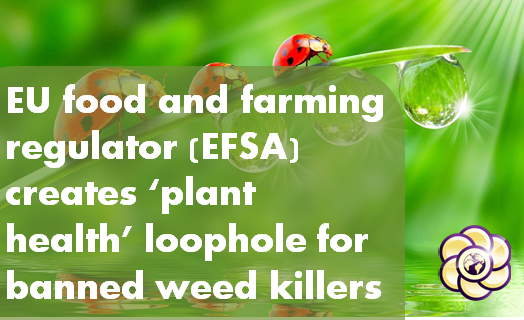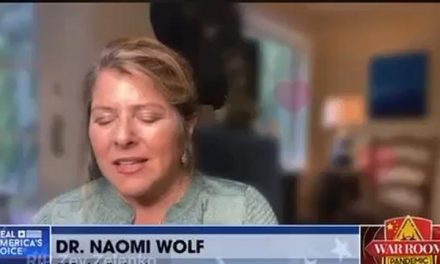The EU’s food and farming safety regulator is trying to create a ‘back door’ system to licence the use of herbicides that have been banned for their toxic impacts on people and wildlife – under a clearly inapplicable ‘plant health’ exemption.
This protocol is a scandal. Weeds will in the worst case cause a reduction of the yield of a crop and not be a serious danger to plant health. Allowing these highly toxic herbicides to be part of this derogation is a grave misuse of the rules.
While Europe has been enjoying its summer holiday, the European Food Safety Authority (EFSA) has been hard at work – creating a massive loophole for EU laws intended to protect people and wildlife from the most toxic and dangerous pesticides.
It took advantage of the lower level of scrutiny over the holiday period topublish a ‘protocol’ for implementing a major derogation (exemption) from the Pesticides Regulation 1107/2009 which is only meant to apply where there is “serious danger to plant health”.
The derogation would apply to herbicides (weed killers) that are still on the EU market but about to be banned based on the 2009 pesticide Regulation that includes ‘cut-off’ provisions for classified carcinogenic, reprotoxic or endocrine disruptive pesticides.
Examples of the herbicides that were due to be banned are Glufosinate (causing birth defects), Epoxiconazole (birth defects, liver cancer), Flumioxazin (toxic for reproduction & for endocrine organs), Pymetrozin (cancers, reduction fertility & effects on endocrine organs).
Monstrous abuse of the ‘plant health’ loophole
EFSA describes its derogation procedure as “concerning the necessity of the application of herbicide active substances to control a serious danger to plant health” and “to confirm the lack of other available means capable of controlling an identified serious danger to plant health.”
But Hans Muilerman of Pesticides Action Network Europe (PAN) responded that the entire premise of the derogation was fraudulent: “This protocol is a scandal. Weeds will in the worst case cause a reduction of the yield of a crop and not be a serious danger to plant health. Allowing herbicides to be part of the Article 4.7-derogation is a grave misuse of the rules.”
Their view is even confirmed by EFSA, he stated, which has itself conceded that “weeds in a strict sense do not directly pose a threat to plant health”.
The derogation was originally designed to allow the use of banned pesticides in cases where plants were suffering from disease caused by, for example, fungal, bacterial or viral infection, or insect attack. That’s controversial enough in its own right – but to extend its use to herbicides is clearly outside the original scope and motivation.
Under Article 4(7) of the regulation, banned pesticides may be permitted “on the basis of documented evidence included in the application an active substance is necessary to control a serious danger to plant health which cannot be contained by other available means including non-chemical methods, such active substance may be approved for a limited period necessary to control that serious danger but not exceeding five years”.
Ignoring legal requirement to promote non-chemical alternatives
EFSA mentions that priority has to be given to non-chemical methods, as required by theSustainable Use of Pesticides Directive 128/2009. However the body has always been quick to dismiss alternatives like mechanical weeding as being less applicable, reliable and effective.
The Directive aims “to achieve a sustainable use of pesticides by reducing the risks and impacts of pesticide use on human health and the environment and promoting the use of integrated pest management and of alternative approaches or techniques such as non-chemical alternatives to pesticides.”
It also requires member states to “adopt National Action Plans to set up their quantitative objectives, targets, measures and timetables to reduce risks and impacts of pesticide use on human health and the environment and to encourage the development and introduction of integrated pest management and of alternative approaches or techniques in order to reduce dependency on the use of pesticides.”
But these provisions of the Directive have been a dead letter – actively undermined by EFSA, member states and the EU Commision, says Muilerman, while EFSA’s ‘plant health group’ has “no knowledge of sustainable crop growing and dismisses available and widely used non-chemical methods.”
“Instead of reducing the use of pesticides by sustainable practices (like crop rotation, mechanical weeding), EFSA promotes the all-out use of synthetic pesticides to fight weeds”, he said. “Resistance caused by overuse of pesticides needs to be countered by use of more pesticides, according to the Authority. This is the chemical treadmill – a dead-end street.
The EU member states should not accept this EFSA protocol since it is undermining sustainable agriculture and decades of environmental and health policy.
By Oliver Tickell
(Source: globalresearch.ca; September 11, 2016; http://tinyurl.com/hmuyw32)
Read More:
http://tinyurl.com/hmuyw32













